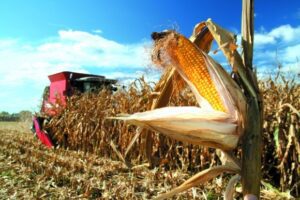
The first cargo of Ukrainian corn weighing 71,000 tons since the beginning of the Russian military invasion of Ukraine went on a P-class vessel to the recipient from the Black Sea port of Constanta (Romania), the Reuters website reported on Friday.
According to him, this port has already received about 80 thousand tons of Ukrainian grain, and the same number is on the way to it.
As Ukraine’s seaports were blocked following Russia’s aggressor country’s invasion of Ukraine in February, the world’s fourth-largest grain exporter has been forced to ship to Romania by train across its western border or through its small river ports on the Danube River.
“Supporting the export of Ukrainian grain means preventing a colossal wave of world hunger provoked by the blockade of Ukrainian ports. Compared to the initial moment, when everyone was looking for alternative transport corridors for grain exports, they are gradually being formed,” Viorel Panaita, president of Comvex port operator, who organized deliveries of a batch of Ukrainian corn.
According to Comvex, the seaport of Constanta owns the fastest-loading grain terminal in Europe, capable of handling up to 70,000 tons of crops per day.
As reported, Ukrainian and Romanian ministries at the end of March began negotiations on the export of agricultural products from Ukraine through European seaports, including the Romanian port of Constanta.
Ukraine has tens of millions of tons of agricultural products in warehouses, but due to a naval blockade by the aggressor country, the Russian Federation cannot supply it to its traditional markets.
The countries bordering Ukraine have responded to its problem with the export of agricultural products, and have already significantly simplified the procedures for registering freight traffic or are actively working on it. In particular, Romania, Slovakia, Hungary, Lithuania, Latvia, Estonia, as well as Italy, Turkey, Bulgaria, Georgia, Denmark, Greece, Austria introduced liberal conditions for Ukrainian carriers.
Before the Russian military invasion, Ukraine monthly exported about 5 million tons of agricultural products through the ports of Odessa and Nikolaev, but now, due to their naval blockade by the Russian Federation, it can transport about 500 thousand tons of grain monthly. This leads to a monthly shortfall of about $1.5 billion in export earnings for the country.
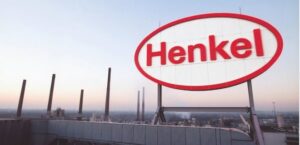
Henkel, an international company headquartered in Dusseldorf, Germany, has announced the resumption of two of its four factories in Ukraine.
According to a press release, the decision to resume production of the international company Henkel in Ukraine is made by the local leadership of Henkel Ukraine, based on the current military-operational situation.
The plant in the Lviv region, which specializes in the production of building mixtures of the Ceresit brand, was the first to resume operations.
Soon Henkel plans to resume the activities of the company’s plant in Vyshgorod, Kyiv region.
In total, Henkel Bautechnik (Ukraine) manages four factories in the country for the production of building mixtures. The company has suspended the work of all production facilities since the beginning of the war – on February 24, 2022.
At the moment, the work of two other production facilities is impossible, since they are located on the territories of Ukraine temporarily occupied by Russian troops in the Kharkiv and Kherson regions.
As noted in the release, to support its employees and their families, Henkel has fully maintained the payment of wages, even despite the temporary suspension of production.
In the early days of the war, Henkel launched a solidarity aid program worth more than EUR1 million, most of which went directly to more than 600 employees as emergency financial assistance. Henkel also provided safe housing for its employees and their families forced to leave Ukraine.
At the same time, Henkel has expanded its solidarity program to a total of more than EUR5 million, including product donations and comprehensive collaboration with long-term social partner Habitat for Humanity.
In early March, Henkel announced that it was stopping new investments in the Russian Federation, as well as stopping advertising campaigns in state media and all sponsorship activities. Subsequently, the company officially announced the decision to stop its activities in the Russian Federation.
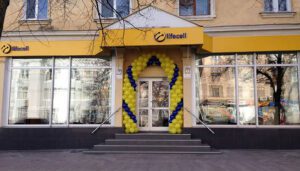
According to the results of January-March 2022, the mobile operator Lifecell LLC (lifecell) recorded a net profit of UAH 209.4 million, which is 2.52 times more than in the same period of 2021.
According to the operator’s press service on Friday, the company’s income in the first quarter of this year increased by 21.5% – to UAH 2.307 billion from UAH 1.899 billion in the first quarter of 2021.
EBITDA at the end of the specified period increased by 20% – to UAH 1.292 billion (in the first quarter of 2021 – UAH 1.077 billion). At the same time, EBITDA margin decreased by 0.7 percentage points to 56% (56.7%).
Lifecell’s capital investments for the first three months of the year increased by 24.3% – up to UAH 711.6 million from UAH 572.4 million in the first quarter of last year.
The active three-month subscriber base of lifecell increased by 11.3% – up to 8.9 million subscribers (8 million in January-March 2021).
Active three-month ARPU grew by 7.1% year on year and amounted to UAH 84.3 (UAH 78.7 a year earlier). At the same time, the 12-month active MoU decreased by 4.1% to 170 minutes (from 177 minutes in the first quarter of 2021).
“Some of our people are fighting on the front lines. The rest, in the conditions of war, do their work during rocket attacks. As soon as our army liberates the territory from the invaders, our brigades, together with contractors, go to the destroyed facilities and resume their work. That is why the first quarter of 2022 can be proud. And I’m glad to be a part of the lifecell team and a part of Ukraine”, commented Ismet Yazidzhi, CEO of lifecell, commented on the results of the quarter of 2022.
As reported, according to the results of 2021, lifecell received a net profit of UAH 610.9 million, which is 4.24 times less than in 2020 (UAH 2.589 billion), while the operator’s income in 2021 increased by 24.1% – up to UAH 8.483 billion. EBITDA increased by 30.9% to UAH 4.751 billion, while EBITDA margin increased by 2.9 percentage points (p.p.) to 56%.
Lifecell’s capital investments in 2021 increased by 3.2% to UAH 3.594 billion.

The Cabinet of Ministers of Ukraine instructed the Ministry of Agrarian Policy and Food to issue licenses for the export of nitrogen mineral and chemical fertilizers in the amount of up to 210,000 tonnes by July 1, 2022, before that, the Ministry of Economy issued permits for supplies.
The corresponding resolution on the change of the licensee body (No. 458) of April 26 was published on the government website.
“The issuance of licenses for the export of goods specified in this paragraph of the notes is carried out on the basis of applications within a quota of 70,000 tonnes per month and on the basis of approvals that are provided by the Ministry of Agrarian Policy within one day without involving a subject of foreign economic activity in the order of interdepartmental exchange of information,” the decision says.
Earlier, by resolution No. 353 of March 24, the Cabinet of Ministers lifted the ban on the export of nitrogen fertilizers that it had introduced in early March, setting an export quota of up to 210,000 tonnes of products for the period until July 1, 2022. At the same time, the monthly export volume should not exceed 70,000 tonnes per month.
As reported, in early March, the government imposed a ban on the export from Ukraine of nitrogen, phosphorus and potash mineral or chemical fertilizers, as well as complex multi-component fertilizers.
Thus, the export of phosphate, potash and multicomponent fertilizers is still prohibited.
“I emphasize that this ban is of a forced and temporary nature and is used to restore the balance of certain goods in the domestic market and ensure the sowing campaign, which is extremely important in order to prevent a food crisis in Ukraine and the world,” Roman Leschenko, who served as Minister of Agricultural policy of Ukraine at that time, said.
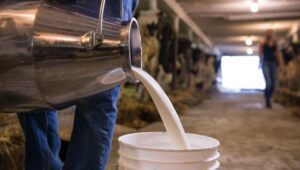
A cost of raw milk produced in Ukraine is constantly rising under the influence of a number of factors, while the purchase prices for it have fallen since the beginning of Russia’s military invasion of Ukraine, the Association of Milk Producers (AMP) said.
In its analysis of the milk market, published on the website of the association, it is noted that although this situation creates pressure on the market, however, since the second decade of April, it has been developing “in the tones of very restrained optimism.”
According to it, the average purchase prices for milk as of April 20 are: extra-class – UAH 10.13/kg, top-class – UAH 9.88/kg, and first-class – UAH 9.40/kg (excluding VAT). At the same time, in the country they fluctuate in the range of UAH 9.5-10.7 /kg (excluding VAT) for extra-class raw milk.
The association notes that the cost of milk production is constantly growing, which is influenced by several reasons at once. Since the beginning of Russian aggression in Ukraine, prices for fuel and veterinary drugs have increased significantly, and the blockade of the export of agricultural products from Ukrainian seaports deprives agribusiness of working capital, the report explains. In addition, in March, due to the war, the cost of milk was affected by a forced revision of the feed ration of cows, changes in the structure of the payment of wages to staff, as well as the transfer of part of milk free of charge in the form of humanitarian aid.
According to AMP, the issue of raw milk cost “so far looks like a snowball that accumulates in the absence of a sufficient level of purchase prices.”
The association assumes that in the near future the milk market in the country will develop under the pressure of the following factors: the nature and intensity of hostilities, the possibility of unblocking seaports and resolving issues of exporting dairy products.
“The market began to feel the demand for dairy products and improved sales conditions in the occupied areas. With the increase of demand and sales, we see an increase in the supply of raw milk. Of course, these are not pre-war prices, but not the prices of the first weeks of UAH 8,” AMP said.
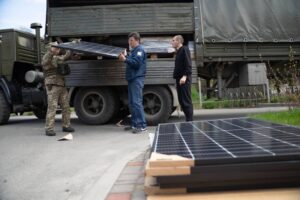
Head of Tesla Inc. Elon Musk, in addition to Starlink satellite Internet stations, donated Tesla Powerwall solar panels to Ukraine.
“Today, two outpatient clinics in Borodianka and Irpin have received Tesla Powerwall solar panels and energy saving systems,” Deputy Prime Minister – Minister of Digital Transformation of Ukraine Mykhailo Fedorov said on Telegram.
According to him, these solar panels and generators have become very popular in America.
“The Powerwall energy system has high autonomy and provides backup power in case of power outages. This ultra-modern equipment will help Ukrainians in the areas most affected by the Russian occupation,” Fedorov stressed.